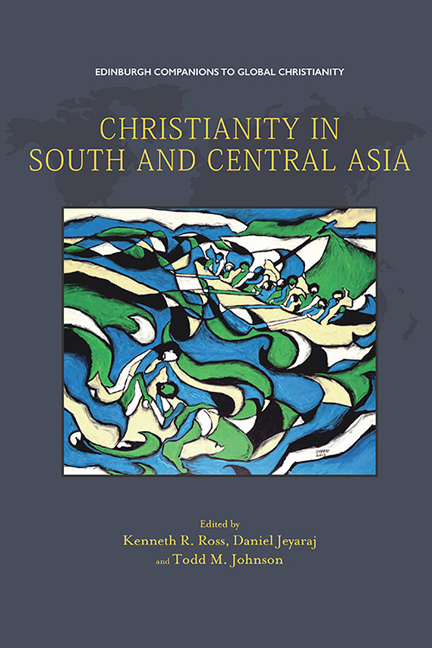The Future of Christianity in South and Central Asia
Published online by Cambridge University Press: 30 April 2020
Summary
Christianity in South Asia is widely accepted as an established faith held by a minority of the population, with its origins in the region going back to the first century. Yet it is widely viewed as a foreign religion established by colonial powers and disruptive of age-old traditions and culture grounded in dominant religions like Hinduism, Islam, Buddhism, Sikhism and Jainism. South Asian theologians describe this perception as the unholy alliance of the missionary, the military and the merchant. Christianity is therefore often perceived as an integral part of the encroaching colonial system that blew away all that was of cultural value on the ground.
Christianity in Central Asia likewise has a long history, having been present in the region from at least as early as the fourth century. Yet it, too, is commonly associated today with a colonial power, in this case Russia and the presence of the Russian Orthodox Church. Currently, it has had to negotiate its space in an area, on the one hand, of Soviet-shaped militant atheism and, on the other, of being a religious minority within communities of Muslim faith.
In the context of the presence of long-established churches – of every denomination in South Asia and primarily the Russian Orthodox Church in Central Asia – the central challenge to Christian communities in South and Central Asia remains the proclamation of Jesus as Lord, as good news to all of creation, amidst diverse people groups, cultures and ideologies. Perhaps this challenge is not so different from the one that faced the insignificant and hard-pressed communities of Christian faith under the Roman Empire during the first century. Like St Paul the Apostle in Athens looking for opportunities to proclaim Christ as Lord amidst a plethora of gods and a culture of Hellenism, Christians in South and Central Asia today proclaim their message amidst a pluralistic context and culture. How can they proclaim Christ as Lord and live out the values of Christ's kingdom among diverse communities experiencing poverty, injustice, corruption and a multiplicity of other social ills in the context of globalisation, often- militant majority religions and the complex geopolitics of these two regions?
- Type
- Chapter
- Information
- Christianity in South and Central Asia , pp. 433 - 444Publisher: Edinburgh University PressPrint publication year: 2019

